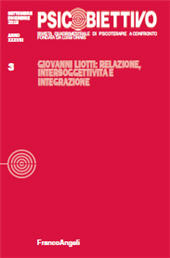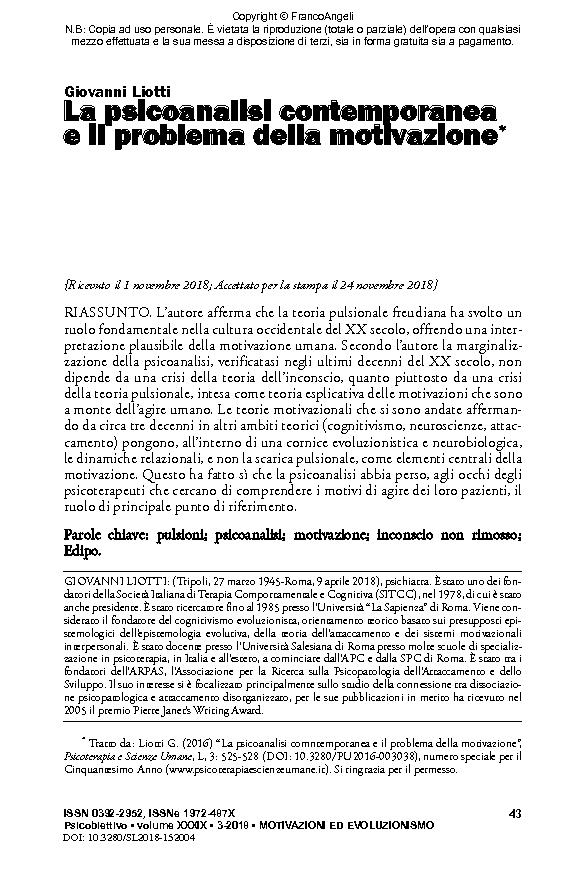2018 - Franco Angeli
Artículo
Digital Version
Download | Copia/pega | Impresión
La psicoanalisi contemporanea e il problema della motivazione
43-47 p.
- L'autore afferma che la teoria pulsionale freudiana ha svolto un ruolo fondamentale nella cultura occidentale del XX secolo, offrendo una pretazione plausibile della motivazione umana. Secondo l'autore la marginalizzazione della psicoanalisi, verificatasi negli ultimi decenni del XX secolo, non dipende da una crisi della teoria dell'inconscio, quanto piuttosto da una crisi della teoria pulsionale, intesa come teoria esplicativa delle motivazioni che sono a monte dell'agire umano. Le teorie motivazionali che si sono andate affermando da circa tre decenni in altri ambiti teorici (cognitivismo, neuroscienze, attaccamento) pongono, all'interno di una cornice evoluzionistica e neurobiologica, le dinamiche relazionali, e non la scarica pulsionale, come elementi centrali della motivazione. Questo ha fatto sì che la psicoanalisi abbia perso, agli occhi degli psicoterapeuti che cercano di comprendere i motivi di agire dei loro pazienti, il ruolo di principale punto di riferimento. [Testo dell'editore].
- The author suggests that Freudian drive theory played a key role during the twentieth-century in Western culture by offering a plausible interpretation of human motivation. According to the author, the marginalization of psycho- analysis, which occurred in the last decades of the twentieth century, does not depend on a crisis of the unconscious theory, but rather on a crisis of the drive theory, under- stood as a theory that explains the motivations that are behind human behavior. The motivational theories that have been affirmed for almost three decades in other theoretical fields (cognitivism, neuroscience, attachment), place within an evolutionary and neurobiological framework, the relational dynamics as central elements of motivation and not the impulse discharge. As a consequence, psychoanalysis has lost, in the eyes of psychotherapists who try to understand the reasons for their patients' actions, the main role as point of reference. [Publisher's text].
Forma parte de
Psicobiettivo : rivista quadrimestrale di psicoterapie a confronto : XXXVIII, 3, 2018-
Información
Código DOI: 10.3280/PSOB2018-003004
ISSN: 1972-487X
KEYWORDS
- Pulsioni, psicoanalisi, motivazione, inconscio non rimosso, Edipo
- Pulsions, Psychoanalysis, Motivation, Unconscious not removed, Oedipus
-
En el mismo archivo
- Editoriale
- La conoscenza umana : attaccamento, emozioni e sviluppo dell'identità personale
- Le emozioni come realtà biologiche a base innata
- La psicoanalisi contemporanea e il problema della motivazione
- La crisi della teoria freudiana delle pulsioni
- Costruzioni sulla teoria dell'attaccamento : verso un modello multi-motivazionale della natura umana
- Il modello relazionale fondato sui sistemi motivazionali
- L'origine collaborativa e intersoggettiva della coscienza : un approccio evoluzionista ed evolutivo
- Per un modello biopsicosociale della mente umana Commento all'articolo di Giovanni Liotti e Mauricio Cortina, L'origine collaborativa ersoggettiva della coscienza : un approccio evoluzionista ed evolutivo
- Attaccamento, Sé e famiglia : tre sistemi interconnessi
- Gianni Liotti, un lampadiere
- L'incontro con la teoria dell'attaccamento e la svolta relazionale della psicoterapia cognitiva
- I miei dialoghi con Gianni Liotti e il problema della compatibilità tra le teorie relazionali della psicoterapia
- Archetipi e sistemi motivazionali : spunti per un confronto fra psicologia analitica e psicologia cognitivo evoluzionista
- Cosa è innato nella psiche? Psicologia cognitivo-evoluzionista e psicologia analitica si interrogano sull'innatismo
- L'aggressività distruttiva nella relazione interumana : una prospettiva evoluzionistica
- Fragilità e precarietà del Sé : l'altra faccia della medaglia della distruttività umana
- Dimensione dissociativa e trauma dello sviluppo
- La dimensione dissociativa fra clinica e neuroscienze



